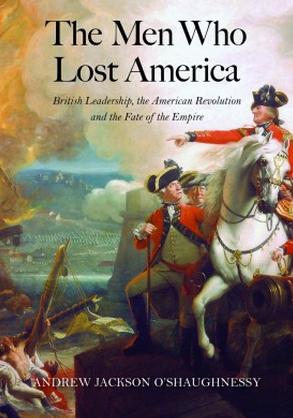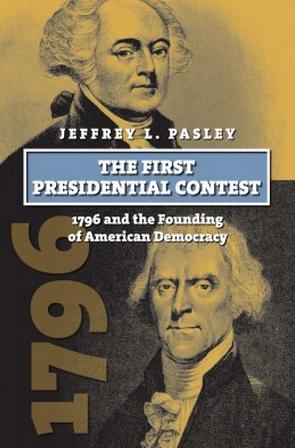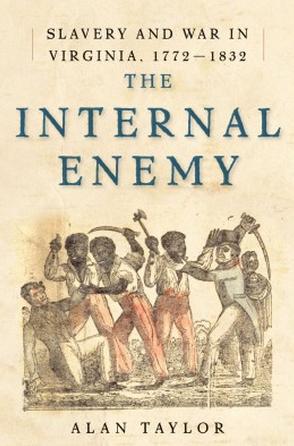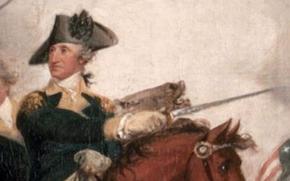To mark the first president’s 282nd birthday, Washington College today announces three finalists for one of the nation’s largest and most prestigious literary awards, the George Washington Book Prize. Now in its tenth year, the $50,000 George Washington Book Prize honors its namesake by recognizing the year’s best new books on early American history.
 The 2014 Washington Prize finalists tackle fresh and engaging topics about the nation’s founding era. In The Men Who Lost America: British Leadership, the American Revolution, and the Fate of the Empire (Yale), Andrew Jackson O’Shaughnessy explores the British perspective on the American Revolution. Jeffrey L. Pasley examines the lively politics surrounding the first contested presidential election in The First Presidential Contest: 1796 and the Founding of American Democracy (Kansas). Rounding out the slate of honorees, Alan Taylor offers new insights into race and slavery in the early Chesapeake in The Internal Enemy: Slavery and War in Virginia, 1772-1832 (W.W. Norton & Co.).
The 2014 Washington Prize finalists tackle fresh and engaging topics about the nation’s founding era. In The Men Who Lost America: British Leadership, the American Revolution, and the Fate of the Empire (Yale), Andrew Jackson O’Shaughnessy explores the British perspective on the American Revolution. Jeffrey L. Pasley examines the lively politics surrounding the first contested presidential election in The First Presidential Contest: 1796 and the Founding of American Democracy (Kansas). Rounding out the slate of honorees, Alan Taylor offers new insights into race and slavery in the early Chesapeake in The Internal Enemy: Slavery and War in Virginia, 1772-1832 (W.W. Norton & Co.).
“In very different ways, our three finalists not only reveal new understandings about the complex legacies of revolution in our young republic but also place American history within a larger, global context,” says Ted Maris-Wolf, Deputy Director of the C.V. Starr Center for the Study of the American Experience at Washington College. “They challenge us to re-think many of our assumptions about race, politics, and diplomacy in early America.”
“These books are just too good to miss. Everyone should know about them,” adds James Basker, the president of the Gilder Lehrman Institute of American History, which co-sponsors the George Washington Prize with Washington College and George Washington’s Mount Vernon. “We want the George Washington Prize to bring great history to a larger public — to teachers, students and general readers everywhere.”
The Prize winner will be announced May 20 at a gala dinner at Mount Vernon.
 This year’s prize holds particular significance for Mount Vernon. In September 2013, the historic estate opened a new state-of-the-art center for scholarly research and educational outreach, The Fred W. Smith National Library for the Study of George Washington. “As we work more closely with scholars who are authoring new works, it becomes increasingly clear that there are many discoveries yet to be made about our country’s founding,” says Mount Vernon’s president, Curt Viebranz. “By honoring these finalists with such a prestigious prize, we are encouraging scholars and researchers to continue learning and sharing more.”
This year’s prize holds particular significance for Mount Vernon. In September 2013, the historic estate opened a new state-of-the-art center for scholarly research and educational outreach, The Fred W. Smith National Library for the Study of George Washington. “As we work more closely with scholars who are authoring new works, it becomes increasingly clear that there are many discoveries yet to be made about our country’s founding,” says Mount Vernon’s president, Curt Viebranz. “By honoring these finalists with such a prestigious prize, we are encouraging scholars and researchers to continue learning and sharing more.”
A jury of three distinguished historians, chaired by Gordon S. Wood and joined by Joyce Appleby and Annette Gordon-Reed, selected the finalists from among 40 books published in the past year. All three jurors are themselves renowned experts in the history of the founding era.
Although each finalist selection touches on Washington’s influence on American and world history, the three books explore decidedly different topics. In The Men Who Lost America, Andrew O’Shaughnessy follows the course of the American Revolution from the “enemy’s” perspective, and corrects popularly held misconceptions of the British. “In a series of deeply researched and clearly written chapters focused on the major British political and military figures,” the jury commented, “he persuasively demonstrates that the British leadership was remarkably talented and able. But he also shows the tremendous limitations under which these leaders had to operate, and in the process, he helps readers understand the eventual American victory.”
A dual citizen of Britain and the United States, O’Shaughnessy is the Saunders Director of the Robert H. Smith International Center for Jefferson Studies at Monticello and Professor of History at the University of Virginia. He is the author of An Empire Divided: The American Revolution and the British Caribbean and is a popular lecturer with both scholarly and general audiences.
 Jeffrey Pasley provides new insight into how the first contested presidential election set the stage for the democratic electoral process. “Pasley captures with verve and wit the frothy politics that emerged unexpectedly at the end of the eighteenth century,” the jury noted. “The First Presidential Contest makes it very unlikely that the 1796 presidential campaign will ever be thrust into the shadows again.”
Jeffrey Pasley provides new insight into how the first contested presidential election set the stage for the democratic electoral process. “Pasley captures with verve and wit the frothy politics that emerged unexpectedly at the end of the eighteenth century,” the jury noted. “The First Presidential Contest makes it very unlikely that the 1796 presidential campaign will ever be thrust into the shadows again.”
Pasley is a professor of history at the University of Missouri. He is the author of a prize-winning book on the early American press, “The Tyranny of Printers”: Newspaper Politics in the Early American Republic. Before entering academia, he was a journalist and a speechwriter on Al Gore’s 1988 presidential campaign. He blogs extensively about early American history for Common-Place.
Alan Taylor’s The Internal Enemy is “a tour de force that is also a complete delight to read,” the jurors wrote. “With great insight and sensitivity, Taylor focuses on the War of 1812 and unveils the heretofore-understudied story of black people’s involvement in that conflict, creating a seamless, and quite rare, melding of social, military, and political history.” Taylor was recently appointed to the Thomas Jefferson Chair in American History at the University of Virginia, after teaching at the University of California, Davis for 20 years. He is an award-winning author of seven books including William Cooper’s Town: Power and Persuasion on the Frontier of the Early Republic (1995), which won the Pulitzer, Bancroft, and Beveridge prizes.
More information about the George Washington Book Prize is available at washcoll.edu/gwbookprize.



Write a Letter to the Editor on this Article
We encourage readers to offer their point of view on this article by submitting the following form. Editing is sometimes necessary and is done at the discretion of the editorial staff.